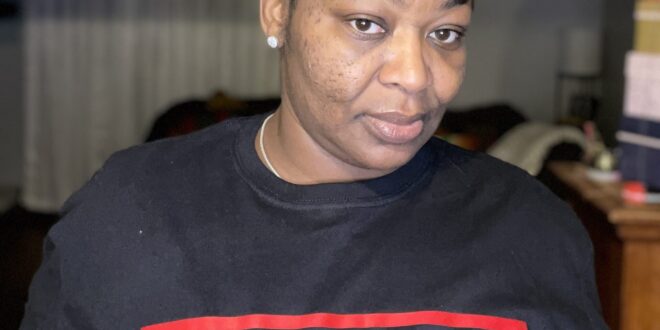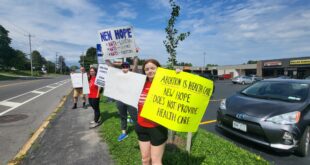Nicole Odom is all in on helping people avoid eviction. It’s what she does does at the Center for Community Alternatives and also the focus of her company Nicole’s Speaking LLC.
By Timia Cobb
Nicole Odom has lived in Syracuse all her life, and never has she been more concerned about the lack of housing in the city, especially on the South Side.
As a case manager for the Center for Community Alternatives‘ Freedom Commons program, Odom helps tenants who have been previously incarcerated find housing and ensures they can stay housed by knowing their rights as tenants.
But, outside of her job, Odom has taken a personal interest in helping anyone with housing issues by creating her own business.
“I started the business, Nicole’s Speaking LLC, and I do eviction prevention and also housing stabilization services,” Odom said. “So, people will contact me and say, ‘hey, you know, what are the resources, what are the laws pertaining to tenants, landlords and things like that, and some housing lists, and so I provide people information.”
Nicole’s Speaking LLC was created out of necessity and concern. Odom said she wants to provide anyone with the resources they need to keep themselves housed and prevent anyone from being wrongly evicted by assuring that tenants know what a landlord can and can’t do and their rights as a renter.
Odom attended a Syracuse Housing Study meeting at the Southwest Community Center earlier this year. While at the meeting, Odom was able to ask questions and learn why many parts of the city lack suitable housing and how investing in housing on the South Side only sometimes means more affordable options for renters. But she was also able to talk to and help residents who might not know what to do with the information they learned at the meeting.
As redevelopment plans begin and more studies point out the obvious problems Syracuse has with housing, Odom wants to be a voice of understanding for citizens who may not know who to turn to or where to start when it comes to finding affordable housing, applying to housing assistance programs, knowing the free resources they can apply to and what they can and can’t do while living at a rental property.
“I’m a lifelong resident of Syracuse, and so the observations that I’m making from the information that’s provided to me because of my professional position, it’s like, okay, what’s going on with the housing situation here in the city of Syracuse and Onondaga County,” Odom said.
Odom invites anyone in the Syracuse area concerned about their housing status or has questions regarding evictions to contact here at 315nicolespeaking@gmail.com.
The Stand talked to Odom as part of a series on leaders of color in the Syracuse community. To nominate someone for a future Q&A, please contact tdcobb@syr.edu.
Here’s more of our interview:
Q: Could you explain what you do in your position with the Center for Community Alternatives Freedom?
A: I provide case management services to the participants of CCA who are tenants of the Syracuse Housing Authority. So what CCA did they partnered with the Syracuse Housing Authority. We’re a nonprofit and a housing authority partner who provides housing to a targeted population. And that population is criminal justice involvement, formerly incarcerated.
Q: So you started Nicole’s Speaking LLC as an expansion of what you do at your day job, but what would happen if someone came to you just needing help on trying to stay in their home, or if they don’t know what to do if they’re rent is being raised and they don’t know if they can afford it. How would you help them? Could you list some of the resources that you suggest for them to use?
A: First, I would get their demographics to get an understanding of what they’re eligible for, making an assessment of their current situation. You know, is this an emergency? Do they need to get off the call with me and call someone immediately? I would direct them, if it’s not an emergency situation, to go to DSS, the Department of Social Services, declare yourself homeless, and they will put you through that process. If it’s after 4 p.m., you’re going to call 211 CNY. And they can place you. they make an assessment or determination about the emergency, is it an emergent situation and where you need to be. They’re gonna put you through their process. Yeah, but that’s the Homeless Housing Coalition. That’s, that’s the process they have in place.
Q: What exactly is 211 CNY?
A: It is a city-county region-wide resource to service programs and organizations for housing, mental health, substance use, disorders, children, and seniors. It has a plethora of information; you call them, they take your information, and then they give you resources, contact information. Because once you identify your needs, they’ll give you who can provide it.
Q: What is the answer for the people who can’t afford to stay in their homes? What is your solution to possibly avoid a possible eviction?
A: We want to prevent homelessness. People are going to do what they want to do, but how do we keep them housed? They’re going to do whatever it is they do. But they have to remain housed because if not, they’re going to be living outside. So, tenants should be required, per the lease that they have to participate in housing stabilization services and eviction prevention services. To address whatever it is that you’re doing, to keep them housed.
Q: So, are you saying being aware of the resources allows you to keep your home but also never puts you in the position to lose it?
A: Right. Because it’s their responsibility to comply with what the lease says. Because housing is a commodity, it’s transactional. So you’re signing the contract, you’re saying I’m gonna pay this much a month, and this is what I’m gonna do while living here. If a landlord is evicting someone just because they don’t like them, you see, that’s, now, you’re infringing on someone’s right to live [there]. If you’re not a problematic tenant, then how can a landlord legally evict you.
Q: Do you think a lot of people within Syracuse, especially in lower-income housing, are aware of what a landlord can and can’t do?
A: Yes and no to some extent, like surface level. Depending on what they’re exposed to. People are aware, but oftentimes people don’t follow up and do their own research to have a firsthand understanding, you know, like, ‘I’ve seen it, this is what it said, I could speak to the law, the statute, whatever it is, at the point of reference.’So I think yeah, a little bit, but not enough to where people are collaborating to make sure that everyone has it.
Timia Cobb is a master’s student at the Newhouse of Syracuse University. Her work for The Stand is supported by the Knight Center and its Combatting Disinformation in Communities of Color grant program.
 The Stand
The Stand


